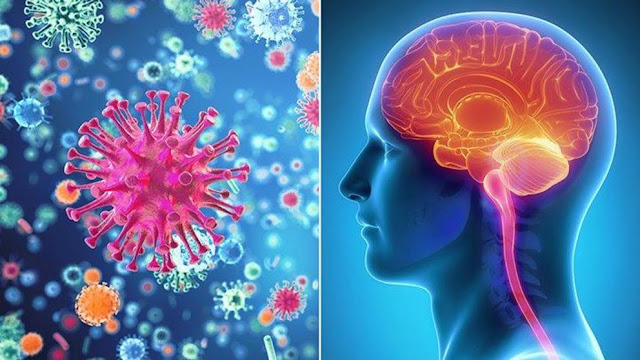MENINGITIS TYPES CAUSES SYMPTOMS TREATMENT AND PREVENTION
Meningitis is an inflammation of
the protective membranes of the human brain or spinal cord. Bacterial or viral
infection that enters the cerebrospinal fluid (CSF), which circulates in the
cavities of the brain and spinal cord, and usually causes inflammation. The
EPIOLOGICAL TYPES OF MENINGITIS
Bacterial meningitis
Bacterial meningitis is one of
the most dangerous diseases, characterized by an emergency and the highest risk
of death. There are vaccines that prevent some types of bacterial meningitis.
Viral meningitis
Viral meningitis is quite
dangerous, but in general it is easier than bacterial. As a rule, if the body's
immune system is functioning normally, patients with this type of meningitis do
not necessarily need special treatment and recover quickly. In addition, there
are vaccines for the prevention of some types of viral meningitis.
Fungal meningitis
Cases of this etiological type of
meningitis are quite rare, although sometimes the fungus spores enter the body
through the respiratory tract to develop the disease. In addition, patients
with diabetes, cancer, and HIV are at increased risk for fungal meningitis.
Parasitic meningitis
There are many parasites that can
cause meningitis or cause diseases of the human brain or nervous system. As a
rule, in comparison with bacterial or viral, parasitic type of meningitis is
quite rare.
Amoebic meningitis
Primary purulent meningitis
(meningoencephalitis) is a rare but deadly disease caused by the amoeba
Fowler's amoeba (Latin Naegleria fowleri), a non-parasitic microorganism that
spreads in warm waters and soils.
Non-infectious meningitis
Meningitis can also be caused by
certain non-infectious causes: cancer, systemic lupus erythematosus (rarely
Liebman-Sachs disease), certain medications, head injuries, and brain surgery.
THE SPREAD OF BACTERIA AND VIRUSES THAT CAUSE
MENINGITIS
Viral meningitis
People can pass on viruses to
others that cause meningitis. If you come in contact with people with viral
meningitis, there is a small risk of contracting the virus.
The causative agents of meningitis are several types of bacteria,
including:
·
Streptococcus pneumoniae (in clinical practice
"pneumococcus")
·
Group B streptococcus, GBS (group B
streptococcus)
·
Neisseria meningitidis (менінгокок)
·
Haemophilus influenzae (Haemophilus influenzae,
Escherichia coli, Pfeiffer's bacillus)
·
Listeria monocytogenes (listeria - the causative
agent of listeriosis)
These bacteria are often associated with another
serious disease - sepsis - a particularly acute and life-threatening reaction
of the body to infection, which can cause tissue damage, organ failure and even
death.
CAUSES OF BACTERIAL MENINGITIS
As a rule, for each age group
different causes of infection and development of bacterial meningitis are
typical:
Newborns: group B streptococcus,
pneumococcus, Listeria monocytogenes, Escherichia coli
Infants and young children:
pneumococcus, meningococcus, haemophilus influenzae type B (Hib infection or hemophilic
infection), group B streptococcus
Adolescents and young people:
meningococcus, pneumococcus
Adults: pneumococcus,
meningococcus, hemophiliac bacillus type B (Hib infection), group B
streptococcus, bacteria Listeria monocytogenes.
RISK FACTORS FOR BACTERIAL MENINGITIS
Accommodation
Infectious diseases are most
common in crowded places.
Health
disorders
People with certain health
problems, as well as those who have undergone certain surgeries or taken
specific medications, are at increased risk for bacterial meningitis.
Work with pathogenic bacteria that cause
meningitis
For example, microbiologists who
regularly work with pathogenic bacteria in laboratories at increased risk of
infection.
HOW BACTERIAL MENINGITIS IS TRANSMITTED
As a rule, the causative agents
of bacterial meningitis are transmitted from one person to another. Some
bacteria are spread through food, such as Listeria monocytogenes. In most
cases, the way bacteria spread depends on their type.
It is important to remember that
people can be carriers of such bacteria and not get meningitis. Such people are
called "carriers". Most vectors do not get meningitis, but they can
infect others.
Here are examples of the most
common ways bacteria can spread from one person to another:
Mothers can infect their babies
with group B streptococcus and Escherichia coli during pregnancy and
childbirth.
Some pathogens are transmitted
through saliva droplets from sneezing, coughing, and close contact, such as
Haemophilus influenzae type B (Hib infection) and pneumococci.
Meningococci are transmitted
through mucous secretions of the respiratory tract or throat (saliva or
sputum). This most often occurs with close (coughing or kissing) or prolonged
contact (living together) with the patient.
Escherichia coli can enter the
body with food prepared by vectors who have not washed their hands after going
to the toilet.
SIGNS AND
SYMPTOMS OF BACTERIAL MENINGITIS
Usually the first symptoms of
meningitis are fever, headache and stiffness (increased tone) of the occipital
muscles. Other common symptoms include:
·
nausea,
·
vomiting,
·
photophobia or photophobia (painful sensitivity
of the eye to light),
·
changes in mental state (confusion).
Unlike older children, newborns and infants
are at increased risk for bacterial meningitis. The most common symptoms of
meningitis in infants are irritability, vomiting, loss of appetite, decreased
activity. In addition, doctors always examine the condition of the big toe and
check the reflexes to diagnose the cause of the disease in children. If you
notice any of the above symptoms in your baby, consult a doctor immediately.
HOW TO PREVENT MENINGITIS
To date, meningitis vaccination
is not included in the vaccination schedule in Ukraine as mandatory, but is
recommended. Therefore, a specific meningitis vaccine is not purchased from the
state budget, but can be purchased from local budgets or other sources not
prohibited by law, or by private individuals




Comments
Post a Comment